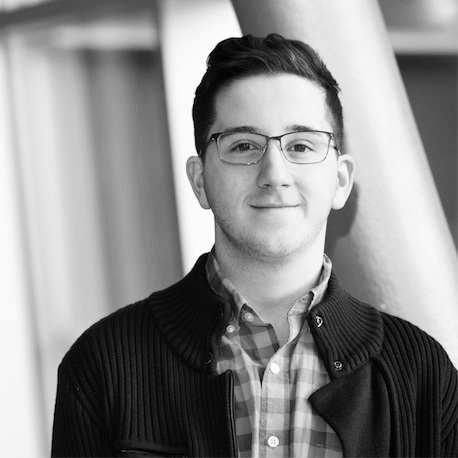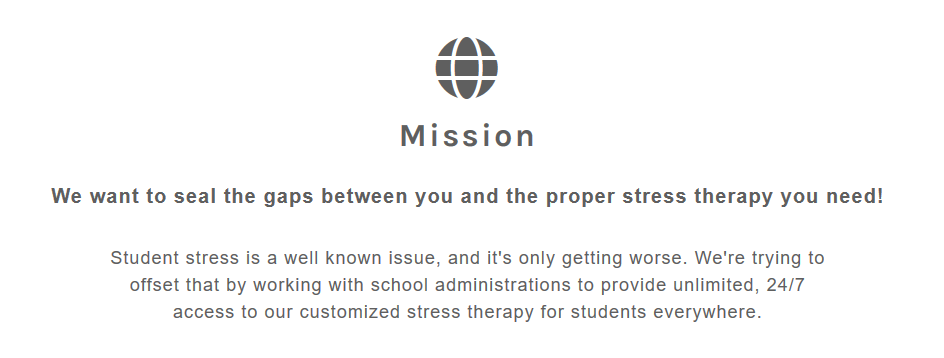Fri

dliand,
Syracuse (NY), and longtime friend Dylan Sen co-founded and operate Awning, a stress management app for students, therapists and educators. The app features customized tools from music therapy to meditation and breathing practices. With a mission of providing school administrations and the students they serve 24/7, affordable stress therapy, the two are working to bridge the gap between students and the proper stress therapy that works for them.
We recently caught up with Daniel to discuss how Awning is paving the way for attainable, always-accessible stress management and what this means for college campuses, especially as mental health awareness continues to grow.
How did you and Dylan come up with Awning?

Awning was a project that Dylan, a good friend of mine from high school, approached mewith when we were home for winter break our senior year. Dylan was studying the neuroscience behind non-pharmaceutical forms of anxiety management in school. The goal was to translate the published research into something tangible. That led to the groundwork for Awning, taking into consideration there is no "one size fits all" approach when it comes to treating stress. The app's main purpose is to customize stress reduction specific to what the user needs at that very moment.
Describe the process of taking the app from a dream into a reality. What are some of the key features you developed that your'e most excited about?
It requires a lot of patience and a lot of faith. We found a phenomenal developer who loves the concept and believes in our mission. Dylan and I are partial to the music therapy feature in the app, which uses Spotify to build playlists of songs that have specific stress reducing musical characteristics. It basically delivers you a playlist designed to calm you down. We're always figuring out our next steps and are currently developing Awning to work with biometric information gathered by wearable devices. We'll essentially be able to detect, assess and treat your stress as it sets in.
In a recent article about the app, it said nearly half of the U.S. population experiences difficulty managing increased stress. Why do you think this is especially prevalent on college campuses?
It's a combination of several factors. For one, most students are young and the sudden transition from high school to college is something they're not entirely prepared for. It's a completely different lifestyle, with increased responsibility and a course-load that's much more demanding than they're used to. As the cost of attending college increases, the pressure to succeed and find a job that gives you the best return on your investment has ramped up exponentially. A 2017 study conducted by the Association for University and College Counseling Center Directors found the average ratio of counselors to students at American colleges is one counselor for every 1,738 students. That's insane. This leads to students needing to wait weeks, often months, for a one-hour session with a school counselor.
How did you create Awning to cater to students' needs? Why do you think resources like this are important on campus?
The approach we use in Awning isn't necessarily designed for students and students alone. It's an approach that would help anyone reduce and manage stress, but our goal is to bring it to students first and foremost, because of how glaring the need is. Dylan and I graduated in 2018, so it hasn't been terribly long (or so we keep telling ourselves), and we know firsthand from our own experiences how badly college campuses need as many mental health resources as they can possibly invest in. What makes Awning particularly helpful for students is the constant accessibility and customization. If you're at the library at 2:30 a.m. studying for an organic chemistry exam, we can help you. If you're an athlete that needs to center yourself in the moments before a big game, we can help. And we do it in a way that takes your exact current state into consideration.

What are some of the short and long-term goals for Awning?
Our objective is to see as many students as possible using the app. We're also partnering with therapists and clinics to offer it to their clientele in a similar B2B style contract. Long-term, we understand stress doesn't only affect students and doesn't vanish once you get your degree. We'd like to branch out into corporate wellness packages and offer businesses bulk subscriptions the exact same way we're partnering with schools.
How did your involvement in the Fraternity prepare you for your professional endeavors?
Upon joining Deltasig, I found myself more motivated to connect with likeminded individuals, contribute to my school and local community and work harder to obtain my goals and aspirations. I suddenly had a community to call my own, which really gave me a sense of belonging in an environment that was far from home. I've managed to make lifelong connections and build crucial skills that I will carry with me through the rest of my professional career and beyond.
What advice would you give an upcoming or recent grad that has helped you?
I firmly believe that cultivating meaningful relationships is crucial. You never know when you might need assistance later in life and you can call upon those people you have in your corner. The network you make in school is much more valuable than grades, internships or courses and it's paid off for us tremendously.